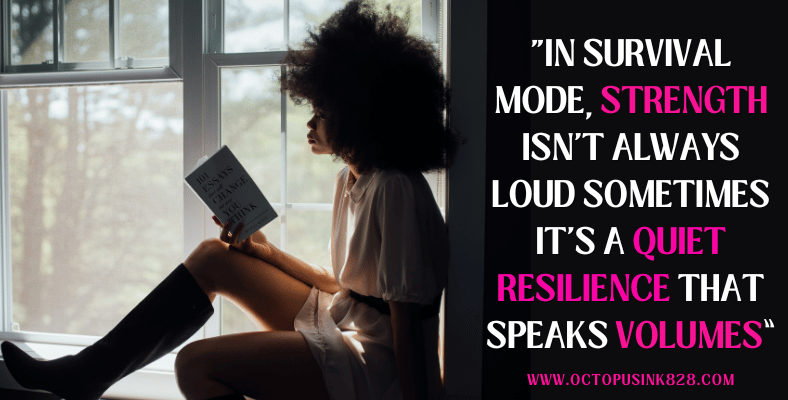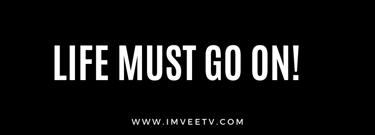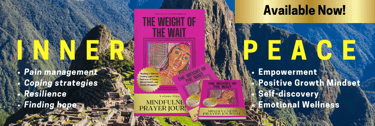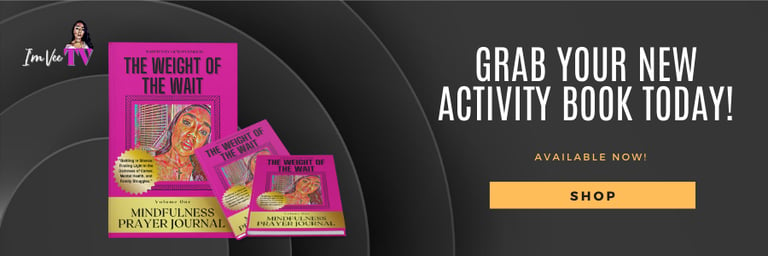7 Signs You're in Emotional Survival Mode (+ How to Recover)
Stuck in emotional survival mode? Discover 7 Signs You're in Emotional Survival Mode (+ How to Recover)"Your breakthrough starts here. Learn to recognize emotional survival mode symptoms and discover mindfulness strategies to recover from burnout and emotional exhaustion.
What is Survival Mode? A Closer Look...
You know those times when life gets super overwhelming? That's when our brains switch to something called Survival Mode. It's like having a mental superhero cape that kicks in when things get tough.
Imagine it as entering a real-life chess match, where every move you make is super important. Survival Mode is basically your brain's way of helping you deal with stress, but the funny thing is, it can make us less aware of how we're feeling.
In Survival Mode, it's as if your brain hits the fast-forward button, and suddenly, you're all about just getting through the day without really checking in on how you're doing. You might feel a bit rushed, a tad more anxious, and really wanting to shield yourself from whatever's causing you stress.
Survival mode is a psychological and physiological response to adversity. It is a state where our focus shifts to immediate survival needs, and our emotional well-being may take a backseat.
In survival mode, our bodies release stress hormones, and our minds become hyper-focused on finding solutions and staying safe. While survival mode can be helpful in short-term crises, it is crucial to find ways to transition out of it and prioritize our emotional well-being.
How to Know If You're in Survival Mode: 7 Clear Warning Signs
Recognizing when you've slipped into emotional survival mode is the first step toward healing. Your body and mind send clear signals when you're operating in this heightened stress state. Here are seven unmistakable signs that you're in survival mode:
1. You're Operating on Autopilot - You go through daily motions without truly being present. Breakfast, work, dinner, sleep—it all blurs together without conscious awareness.
2. Decision-Making Feels Impossible - Even simple choices like what to eat for lunch become overwhelming. Your mental energy is completely depleted, leaving nothing for everyday decisions.
3. Emotions Feel Numb or Explosive - You either feel nothing at all, or your emotions swing wildly from calm to intense anger or tears within moments. There's no middle ground.
4. Your Body is Constantly Tense - Notice your jaw clenching, shoulders raised, or fists balled up? Physical tension becomes your new normal, and relaxation feels foreign.
5. You're Hyper-Focused on Threats - Your brain scans constantly for the next problem, criticism, or crisis. Positive moments barely register because you're always waiting for the other shoe to drop.
6. Rest Doesn't Restore You - Even after sleeping or taking a break, you still feel exhausted. True restoration requires more than physical rest when you're in survival mode.
7. You've Lost Interest in Things You Once Loved - Hobbies, friendships, and activities that brought joy now feel like obligations or simply don't interest you anymore.
If you identify with three or more of these signs, your nervous system is likely stuck in survival mode and needs intentional care to reset.
Emotional Turmoil: Defining the Unsettled State
Emotional turmoil is like being on a wild emotional ride where things inside us are constantly shifting and changing like the weather. It's when we feel really strong emotions, like being super sad, angry, scared, or just totally confused. When we're in this emotional whirlwind, finding a calm and peaceful state within ourselves becomes pretty tricky.
But guess what? You're not alone in this journey. We all face the challenge of discovering that inner calm amidst the turbulence. So, buckle up for the ride, knowing that understanding and embracing these emotional waves is the first step to finding your own oasis within the storm.
Emotional Survival Mode vs. Burnout: What's the Difference?
Many people use these terms interchangeably, but understanding the difference can help you identify what you're experiencing and choose the right recovery path.
Survival Mode is your body's immediate response to stress or perceived danger. It's the "fight, flight, or freeze" reaction that kicks in when life feels overwhelming. Think of it as your emergency response system. In survival mode, you're hyper-alert, reactive, and focused solely on getting through each moment. This state can last days, weeks, or even months if the stressor doesn't resolve.
Burnout, on the other hand, is what happens when survival mode goes on for too long without relief. It's the exhaustion stage where your body and mind have depleted their reserves. Burnout is characterized by emotional numbness, cynicism, decreased performance, and feeling like you have nothing left to give.
Here's a simple way to understand it: Survival mode is running on adrenaline; burnout is running on empty.
Key Differences:
Energy Level: Survival mode = anxious energy and hypervigilance; Burnout = complete depletion and apathy
Emotional State: Survival mode = heightened emotions and reactivity; Burnout = emotional flatness and detachment
Recovery Time: Survival mode can shift with immediate stress relief; Burnout requires extended rest and lifestyle changes
Physical Symptoms: Survival mode = tension and racing heart; Burnout = chronic fatigue and weakened immunity
Both states require attention and care, but burnout typically needs more intensive intervention and longer recovery time. The good news? Catching yourself in survival mode before it progresses to burnout gives you a better chance at quicker recovery.
Emotional Self-Care for Black Women: Nurturing the Soul
Emotional self-care is a vital practice for everyone, but it holds particular significance for black women who often face unique challenges. Did you know? Recent studies highlight a powerful narrative about Black women and self-care that demands our attention.
Black women showcase incredible love, strength, wisdom, and resilience. However, according to studies we also battle with stressors, from societal pressures to systemic inequalities. To explain this in simple life terms “All My Life I Had To Fight”.
The game-changer? Taking intentional care of ourselves is a game-changer. Studies consistently show that when we make a conscious effort to look after our emotional and mental well-being, it makes a significant positive impact. It's not just something good to do; it's a must-do for navigating life's complexities.
Join me as we uncover practical strategies and engaging mindfulness activities designed to empower, uplift, and revolutionize the concept of self-care for Black women.
Understanding Emotional Intelligence: The Power Within
Emotional Intelligence (EI) is the ability to recognize, understand, and manage both your own emotions and the emotions of others. It involves being aware of how emotions impact your thoughts and actions, as well as recognizing and empathizing with the emotions of those around you.
Here are some key components of Emotional Intelligence:
Self-awareness: Recognizing and understanding your own emotions, including how they affect your behavior and decisions.
Self-regulation: Managing and controlling your emotions effectively, especially in challenging situations. This involves staying calm under pressure, controlling impulsive reactions, and adapting to changing circumstances.
Motivation: Being driven to achieve goals and being able to bounce back from setbacks. Motivated individuals with high EI are often more resilient and persistent.
Empathy: Understanding and sharing the feelings of others. This involves being able to see things from someone else's perspective and responding with compassion.
Social skills: Building and maintaining positive relationships with others. This includes effective communication, conflict resolution, and collaboration.
Emotional Intelligence is a valuable skill in personal and professional life. Individuals with high EI are often better at navigating social situations, managing stress, and fostering positive relationships.
Developing emotional intelligence involves self-reflection, active listening, and a willingness to understand and connect with others on an emotional level.
Examples of the Exhaustion Stage: When Survival Becomes Overwhelming
Emotional Intelligence is a valuable skill in personal and professional life. Individuals with high EI are often better at navigating social situations, managing stress, and fostering positive relationships.
Developing emotional intelligence involves self-reflection, active listening, and a willingness to understand and connect with others on an emotional level.
The Exhaustion Stage, also known as the burnout phase, occurs when the challenges and stressors of survival become overwhelming, taking a toll on an individual's physical and mental well-being.
During this stage, the ongoing stress begins to show its impact over time, making it much harder to deal with.
Here are a few examples to help you spot when you're in the Exhaustion Stage:
Physical Fatigue: Persistent and extreme tiredness that goes beyond normal fatigue, impacting the ability to carry out daily activities.
Emotional Drain: Feeling emotionally depleted, experiencing heightened irritability, mood swings, and a sense of hopelessness.
Cognitive Decline: Difficulty concentrating, memory lapses, and reduced cognitive functioning due to the ongoing stress load.
Decreased Performance: A decline in overall performance, both at work or in personal responsibilities, as the energy to meet demands diminishes.
Health Issues: Increased susceptibility to physical ailments, such as headaches, stomach problems, and a weakened immune system
Withdrawal and Isolation: A tendency to withdraw from social interactions and a desire to be alone due to the exhaustion of dealing with external stressors.
Loss of Motivation: Feeling disheartened and experiencing a significant loss of motivation and enthusiasm for activities that were once enjoyable.
Sleep Disturbances: Disrupted sleep patterns, including difficulties falling asleep, staying asleep, or experiencing restful sleep.
Regnizing these signs is crucial, as it indicates that the stress has reached a point where it is impacting various aspects of one's life. Seeking support, whether from friends, family, or professionals, becomes essential to navigate through and recover from the Exhaustion Stage.
5 Practical Steps to Exit Survival Mode Naturally (With Jesus as Your Helper)
Breaking free from survival mode doesn't happen overnight, but these five evidence-based strategies combined with faith can help you begin your journey back to emotional balance. Remember, Jesus said "Come to me, all you who are weary and burdened, and I will give you rest" (Matthew 11:28). He is your ultimate helper in this healing journey. The key is consistency and self-compassion as you implement these practices.
Step 1: Activate Your Parasympathetic Nervous System (Breathe with the Spirit)
Your parasympathetic nervous system is your body's natural "rest and digest" mode—the opposite of survival mode. Combine these calming techniques with prayer for powerful results:
Box Breathing with Prayer: Inhale for 4 counts (breathe in God's peace), hold for 4 (receive His presence), exhale for 4 (release your burdens), hold for 4 (rest in Him). Repeat for 2-3 minutes while silently praying "Jesus, breathe Your peace into me."
Cold Water on Your Face: Splash cold water or use a cold compress on your face to activate the "dive reflex" that naturally calms your nervous system. As you do, thank God for the gift of your body's ability to heal.
Humming or Singing: The vibrations stimulate your vagus nerve, which controls your relaxation response. Try humming a worship song or hymn—let praise be your medicine.
Practice one of these techniques twice daily, inviting Jesus into each moment of intentional calm.
Step 2: Create "Safety Anchors" in Your Environment (Build Your Altar)
Your brain needs tangible proof that you're safe right now. Just as Old Testament believers built altars as reminders of God's faithfulness, create physical reminders that ground you in His presence:
Designate a "prayer corner" with your Bible, journal, soft textures, calming scents, or meaningful photos
Keep a cross, scripture card, or anointing oil nearby to touch when anxiety rises
Play worship music or instrumental hymns that signal to your brain "this is sacred, safe time"
Light a candle while you pray, making it a ritual that says "I'm entering God's presence now"
These anchors train your nervous system to recognize safety while reminding you that Jesus is your ultimate refuge. "The name of the Lord is a fortified tower; the righteous run to it and are safe" (Proverbs 18:10).
Step 3: Establish Non-Negotiable Boundaries (With Jesus-Centered Wisdom)
Survival mode often stems from chronic overextension. Jesus himself withdrew to pray and set boundaries with crowds seeking Him. Setting boundaries isn't selfish—it's biblical stewardship of the life God gave you:
Say "no" to at least one commitment this week that drains your energy. Pray: "Lord, help me discern what You're calling me to and what I need to release."
Set specific "Sabbath hours" where you rest from work, emails, and stressful activities—honoring God's command to rest
Communicate your limits clearly with grace: "I can help with X, but not Y right now. I'm trusting God to provide another way."
Give yourself permission to cancel plans when overwhelmed, knowing Jesus sees your need for rest
Remember: boundaries protect the peace Jesus died to give you. "Let the peace of Christ rule in your hearts" (Colossians 3:15).
Step 4: Move Your Body in Gentle Ways (Temple Care)
Your body is the temple of the Holy Spirit (1 Corinthians 6:19). You don't need intense workouts to exit survival mode—gentle, prayerful movement honors God while releasing tension:
Gentle stretching or yoga with prayer for 10-15 minutes. As you stretch, thank God for each part of your body and its ability to heal.
Prayer walks in nature without your phone. Walk slowly, notice God's creation, and talk to Him about what's weighing on you.
Worship dancing freely to praise music in your living room. Let movement become an offering of thanksgiving.
Progressive muscle relaxation with scripture: Tense and release each muscle group while speaking Psalm 23 over yourself.
Physical movement helps process stress hormones while creating space for the Holy Spirit to minister healing to your body and soul.
Step 5: Practice Micro-Moments of Joy (Counting Blessings)
Survival mode narrows your focus to threats. Intentionally seeking God's goodness in small moments rewires your brain to notice His faithfulness. This is biblical gratitude in action:
Savor your morning coffee or tea as an act of thanksgiving—"This is the day the Lord has made" (Psalm 118:24)
Notice three evidences of God's care during your day (a flower He created, a kind smile, a beautiful sunset)
Play a worship song and really listen, letting it minister to your spirit
Spend 5 minutes with a pet or watching something that makes you laugh—joy is a gift from God
These micro-moments might feel insignificant, but they're powerful spiritual practices. They train your brain to see that God is good, present, and working—even in hard seasons. "Taste and see that the Lord is good" (Psalm 34:8).
Implementation Tip: Don't try all five steps at once. Start with one or two that resonate most, pray over them, practice them for a week, then gradually add others. Jesus is walking this healing journey with you—you're not alone. Recovery is a journey, not a race, and "He who began a good work in you will carry it on to completion" (Philippians 1:6).
Survival Games: Navigating Life's Challenges
Picture this: Life, your very own game, complete with highs, lows, and unexpected plot twists. Sounds familiar, right? It's like we're all in this grand adventure, trying to figure out the rules as we go along. Now, imagine "The Weight of the Wait' book series as your personalized game guide for emotional survival.
Life's challenges aren't obstacles to avoid but levels to conquer, and each book in the series is like your secret map, guiding you through the maze. Resilience becomes your strength, and adaptability your trusty tool in this emotional survival game.
'The Weight of the Wait' transforms the journey of overcoming emotional hurdles into an interactive game. It's not about avoiding challenges but learning how to navigate them with wisdom and strategies. Each page turned is like unlocking a new skill, helping you face the complexities of life head-on.
So, here's to embracing the reality of life's challenges and turning them into opportunities for growth. The 'Weight of the Wait' series is not just a collection of books; it's your toolkit for mastering the emotional survival game. Get ready to play, strategize, and level up in the grand adventure of your own life.
Faith and Emotional Healing: Finding Peace in the Storm
For many of us, faith isn't just something we do on Sundays—it's our lifeline. It's what kept our grandmothers and ancestors going through impossibly hard times. It's what gets us through today.
When emotional survival mode feels like it's crushing you, turning to Jesus is the only source of strength powerful enough to carry us through the darkest valleys. Jesus promised, "I am with you always" (Matthew 28:20), and in survival mode, that presence becomes everything.
The Power of Spiritual Grounding:
There's deep wisdom in the words "Be still and know that I am God" (Psalm 46:10). In survival mode, stillness feels impossible, yet it's exactly what our souls need.
This isn't about toxic positivity or pretending struggle doesn't exist—it's about acknowledging that even in our darkest moments, we're not abandoned.
Practical Faith-Based Practices for Emotional Healing:
Prayer as a Releasing Practice - Instead of just presenting requests, try prayers of release. Speak aloud the burdens you're carrying, giving them over to God. "Father, this anxiety isn't mine to carry alone. I release it to You."
Scripture Meditation for Nervous System Regulation - Choose calming scriptures and speak them slowly, breathing deeply between phrases:
"The Lord is my shepherd; I shall not want" (Psalm 23:1)
"Cast all your anxiety on him because he cares for you" (1 Peter 5:7)
"Peace I leave with you; my peace I give you" (John 14:27)
Worship as Emotional Release - Put on worship music and allow yourself to feel. Cry if you need to, dance if you're moved to, or simply sit in the presence of that music. Worship isn't about performance; it's about connection.
Fasting with Purpose - Biblical fasting isn't just about food—it's about creating space for God to work. Consider fasting from social media, negative self-talk, or draining relationships while focusing on spiritual nourishment and consecration
Your emotional healing journey is sacred. Combining practical mental health strategies with spiritual practices isn't weakness—it's wisdom. God gave us both faith and the ability to seek healing through various means. Honor both.
Mindful Resilience: Surviving and Thriving with 'Weight of the Wait
Life often presents challenges that feel like a heavy burden on our shoulders. If you've experienced those moments of struggle, I discovered this mindful practice that literally transformed my life.
I went through a storm in my life that had me in a dark place filled with tears, sadness, hurt, disappointment, struggle, frustration, pain, and all the other emotions that come along with depression.
Through my trials I had no choice but to depend on God, my anchor, my strength, my peacemaker, my comforter, my friend. Having a healthy relationship with God helped me to hold on giving me the strength I needed to remain resilient.
The practice that became my lifeline? Mindfulness journaling. It literally has been “paper medicine” for me. Let me introduce you to this mindfulness self help book series that I created to help me navigate life’s ups and downs, it's like having a comforting friend offering wisdom and support.
This is a mindfulness book series titled “The Weight Of The Wait” Filled with silent narratives that resonate with the challenges we all face. “The Weight Of The Wait” is a mindfulness activity book series designed as a stress relief tool to help you navigate the struggles of life. Its filled with fun, interactive mindful activities, and helpful strategies to help you overcome trauma and begin to heal.
Remember, life isn't about dwelling on things beyond our control. Through prayer, fasting, obedience to God's Word, and unwavering faith, we can find strength. As the scripture says, "Trust in the Lord with all your heart and lean not on your own understanding; in all your ways submit to him, and he will make your paths straight" (Proverbs 3:5-6).
So, my friend, if you're ready to embark on a GROWTH MINDSET, join us on our wellness journey. Lets navigate life's challenges together, finding strength, wisdom, and healing along the way.
























